If you can’t speak the language, deciphering genealogy documents can be quite the challenge. While I am always here if you’d like the help of a professional translator, sometimes it’s nice to have quick and easy online resources you can turn to in a pinch. Below, find four popular online translation resources, and my thoughts on each:

1. Google Translate
Google Translate is perhaps the most well-known online translation tool. While Google Translate can work well for individual words (such as Bruder for brother) or very short phrases, you do need to be cautious when using it for anything else. In Six Reasons Why a Human is Better Than Google Translate for Genealogy Documents, I outline the shortcomings of this tool for genealogy. For the purposes of this article, however, the two most important factors working against this tool are:
- Genealogy documents contain many old-fashioned words and idioms that this machine translation doesn’t recognize.
- Google Translate can’t always tell the meaning of the word for the context that pertains to your specific document.
For example, take the English word “run”. “Run” can mean jog quickly (She runs in the park), manage (She runs a business), a tear (a run in your stockings), a political race (She runs for office), and so on. How is Google to know exactly what definition your document requires?
That being said, Google Translate is continuing to improve, so feel free to use this tool every now and then – just try to stick to individual words or phrases to give the site less room for error. And if you can, verify the definition provided with a second source!
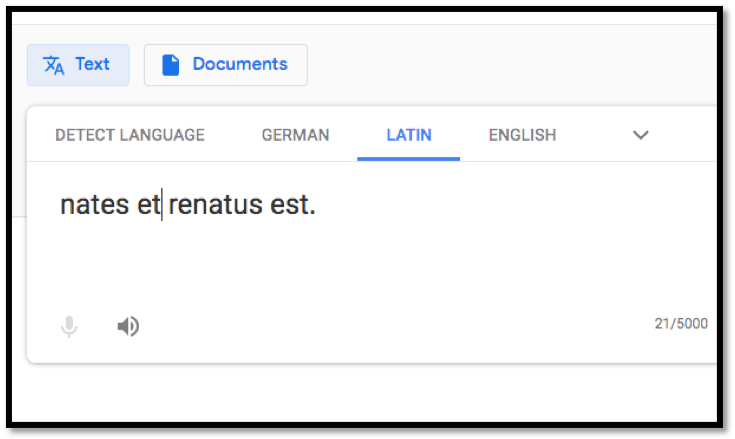
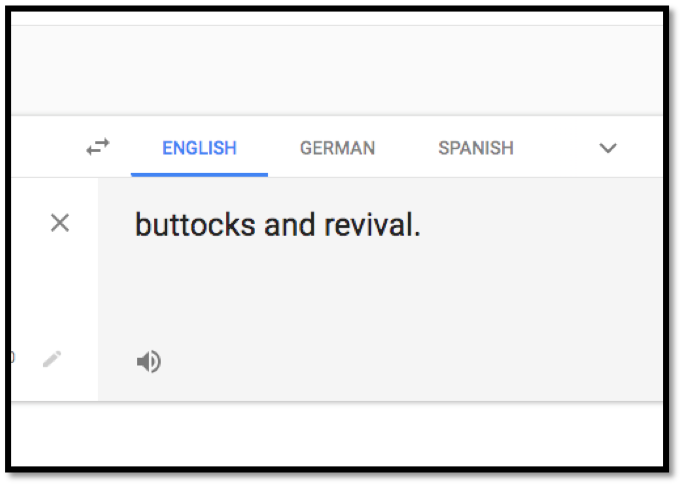
In the example above, I was trying to figure out what the Latin phrase “natus et renatus est” meant in my German document. Google, for some reason, came up with “buttocks and revival”. Not sure where that came from – the phrase means “born and baptized”. So always take Google’s translations with a grain of salt!
2. DeepL
Deepl.com is a relatively new translation tool, and I like it much better than Google Translate. While it does have similar shortcomings to Google in terms of genealogy documents, I find it to be more accurate overall. It’s actually helpful to use both together – copy and paste your phrase into Google Translate, and then copy and paste it into DeepL. Does one give you a better translation than the other?
If you are dealing with idioms, DeepL is definitely better than Google Translate. While Google Translate still tends to translate idioms word for word, providing you with a literal translation (cats and dogs are actually falling out of the sky, instead of it’s raining hard), DeepL will often provide you with the actual meaning of the idiomatic phrase.
Below, I typed the German idiom “Ich verstehe nur Bahnhof” (I don’t understand anything at all) into both tools. Google translated the phrase literally, giving you the result “I only understand train station.” This would make no sense to you as an English speaker, and could completely change what you think your ancestor’s document means. DeepL, however, recognized that the phrase was an idiom, translating it as “It’s as clear as mud” and providing you with an alternative below that “It’s all Greek to me.” One point for DeepL!

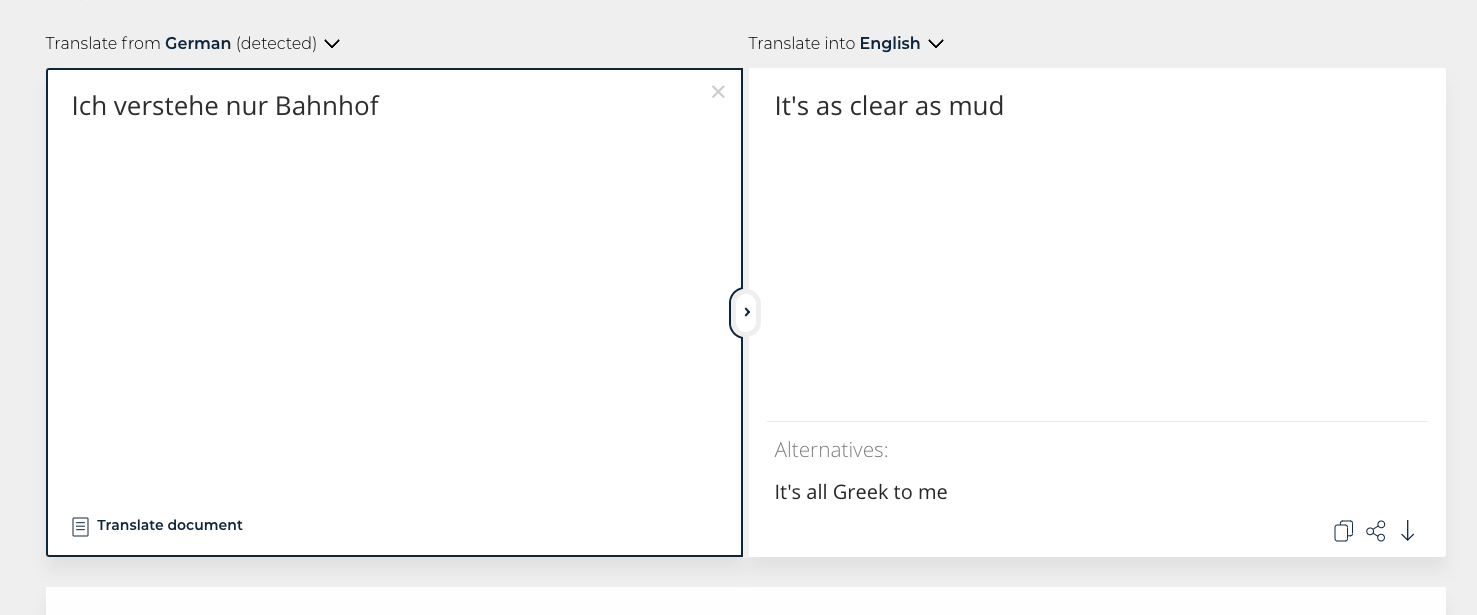
3. Linguee.com
If you have a word or short phrase and want to be more certain of an accurate translation, then Linguee is the site for you. This tool shows you your German word or phrase translated into English by actual translators instead of machines. Upon clicking search, the site provides you with the word’s definition, as well as various sample sentences that include your word/phrase in a specific context (in both German and English). Scroll through the examples, and find which definition of the word best matches the context of your document.
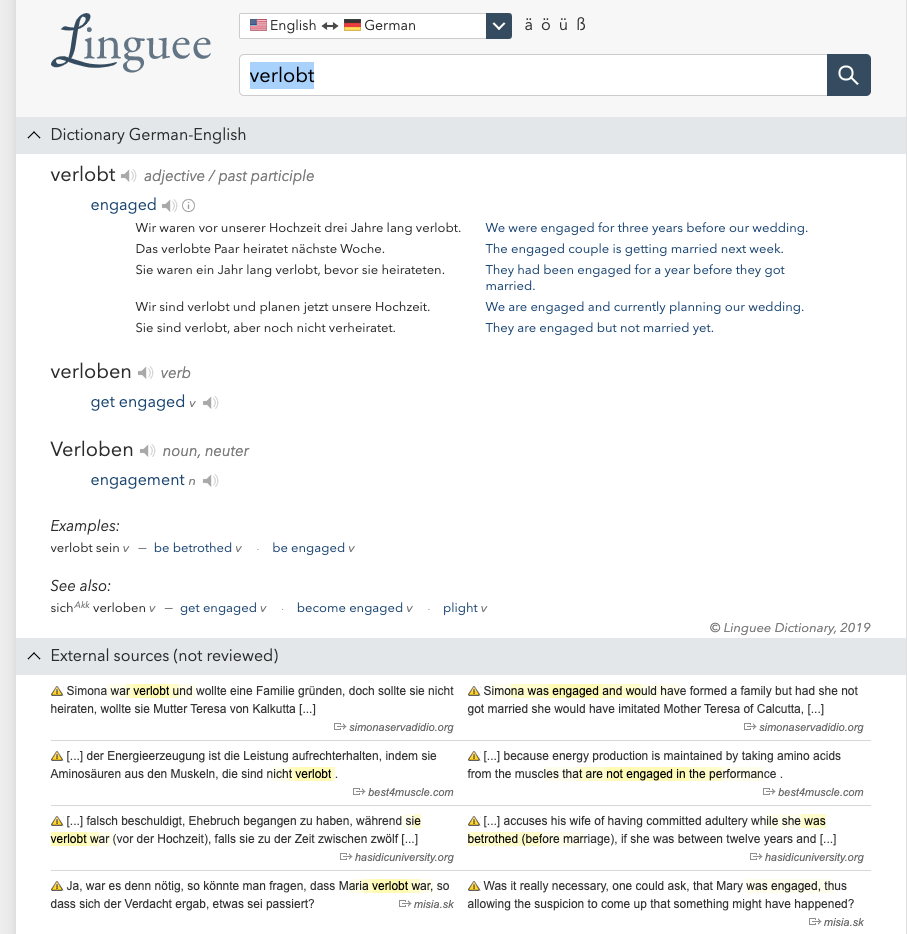
Above, you can see the word verlobt (engaged) used in various sentences and phrases, which helps you to understand its specific meaning more clearly.
On Linguee, the translation that occurs the most on the right side is usually the most accurate translation, but make sure that it makes sense within the context of your own document!
4. Word Reference
WordReference.com is a great online dictionary that often provides sentence examples for the word in question. Again, this helps you to understand if your word is being translated correctly in context. Notice how it provides various meanings and examples for the word “married” below.
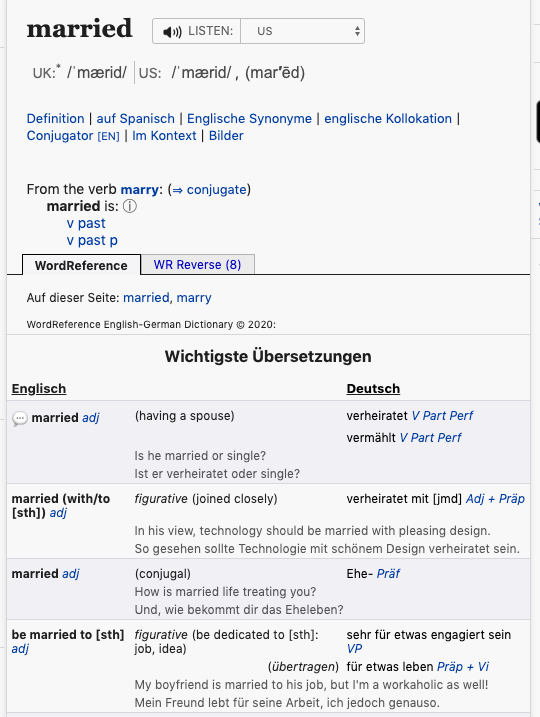
5. Woerterbuchnetz
Woerterbuchnetz.de is a collection of old-fashioned German to German dictionaries. One of the main problems with using modern dictionaries in genealogy is that some of the words themselves are definitely not modern! This site provides definitions for those old-fashioned words – although, as stated above, the definitions are in German.
But don’t let that scare you! This is where DeepL.com comes in handy – simply copy and past the German definition into DeepL, and this should be enough to give you the gist of what your word means.

Conclusion
In conclusion, we are lucky we live in an age where there are so many translation tools available on the Internet. However, it’s important to understand how each tool works, as this will allow you to make sure you are translating your German words as accurately as possible.
Finally, if you’d like a bit of a boost with the German language, see German Language Insight for Genealogists. And if you do choose to go with a translator, see 5 Tips for Getting the Most Out of Your Genealogy Translation.
Happy translating!

16 Responses
Thank you for reviewing these sites. Have only used Google up to now ,and after seeing differences with DeepL, was ready to feed sentences instead of paragraphs into both in hopes of getting a more accurate translation. I’m glad to know about Liguee also, and will use it for short sentences. These are great tips.
Thanks, Jo – this article was in part inspired by you and our discussion of Deepl!
Hi Katherine,
In my view and experience, DeepL is way superior to Google Translate but to each his own :). One other thing I have found recently is that in spite of DeepL being built on Linguee, Reverso
( https://context.reverso.net/translation/english-german/lineage, [example chosen at random])
gives better results than it does. Give it a try…
Take care, stay well.
R. McK.
I agree that Deepl is better than Google Translate for sure. Reverso is also great. Thanks for the tips!
I had Deepl for more than a year and it would pop open and close on its own at times. Recently it opened a black box and I could not close it. I went into my downloads and located Deepl and uninstalled it. That was the only way to get rid of the black box. I am very glad to be rid of Deepl. I will try a different translator and thank you for this reference.
Hi Dolores – yes, I don’t use the downloaded version! You can just use it in your browser if you like without needed to install it on your computer.
I like Leo. It had no problem with “Ich verstehe nur Bahnhof”
VERY helpful. I subscribe to the DeepL Pro level and have had mixed results when trying to translate typewritten 17th century German letters that appeared as excerpts in history books. The program doesn’t seem to recognize antiquated vocabulary or sentence structures. Often my translation would be a mess. But I discovered something this week. I ran several passages through as German to American English, then ran it through again as German to United Kingdom English and compared the results. The UK English was remarkably better than American versions. Phrases that simply were unreadable and remained as misspelled German “garbage” suddenly became translated to a much greater extent. So now UK English is my choice every time. Having multiple translations of the same text really helps — one captures what another does not.
Glad you enjoyed the article Barbara! That is a wonderful trick about the UK English – do you mind if I share it when talking about this in the future? I never thought of that!
I’m still looking for that perfect translator that covers both German and Norwegian so that I don’t have to continue to use separate ones for each language. Most of the time Google Translate just doesn’t cut it, other than making me laugh.
Katherine,
Have you seen Yandex Translate: https://translate.yandex.com/? I have found it especially useful for translating Latin from church documents into English.
No, I haven’t, but I’ll check it out – thanks Jane!
Katherine
Thank you. Have a 4th cousin living in Germany who recommended DeepL and I have been happy with it. I believe it works well going from English into German. How do the others rate translating our confusing English language into German? After all, if we find cousins who are not great at English, we need to be sure our message to them is properly translated.
Glad that you use it and like it, David! Not sure how they do in reverse – but likely something similar! 🙂
Great information. Occasionally I have need to translate phrases from Plattdeutsch and have stumbled through by using dictionaries in a word-by-word translation from Plattdeutch into German, which does not work well. Any suggestions on how to tackle this kind of translation?
I actually don’t have any good Plattdeutsch resources, Joy 🙁 I usually just stumble through online dictionaries myself. I’ll let you know if I come across anything good in the future!